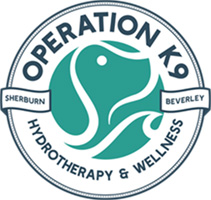Beverley’s leading canine hydrotherapy and rehabilitation centre Fit4Dogs has a new owner.
Rebecca Wilkinson, a veterinary nurse who has run Operation K9, a canine wellness business in nearby Scarborough since 2014, has taken on the business from founder Kirsty Skeates.
The centre will be renamed Operation K9 Beverley and will continue its dedication to providing care for dogs in the region who need treatment following surgery, injury and conditions such as arthritis and to improve dogs’ fitness and well-being.
Rebecca said: “I’ve worked with Kirsty from the beginning of her hydrotherapy business so I’m really looking forward to meeting dogs and their owners who are already using the facility and learning what they need and how I can help them.
“As a vet nurse and rehabilitation specialist, I’m planning on bringing innovative, state-of-the-art equipment and delivering specialist training for the existing team.
“We’ll also be tailoring the treatments to meet the specific needs of each individual dog, working alongside the referring vets and supporting pet parents.”
Former owner Kirsty added she was thrilled to be handing over the business to her long-standing colleague and mentor.
She said: “I have every confidence that Rebecca and the team will continue to provide clients with exceptional care and service.”
The new Operation K9 branch, on Annie Reed Road, is equipped with a water treadmill and hydrotherapy pool and is soon to introduce new aquatic massage therapy. It also offers treatment rooms for dogs in need of physiotherapy and laser therapy.
Rebecca and the team of four hydrotherapists are registered with IRVAP, the Institute of Registered Veterinary and Animal Physiotherapists, and the Beverley site is set to host training events for pet professionals and owners.
“We hope to make Operation K9 the go-to place for people looking to improve the health, fitness and well-being of their dogs across Beverley and East Yorkshire,” Rebecca explained.
“As a leading rehabilitation centre, we also plan to be an education hub for pet professionals looking to improve their understanding of small animal complementary therapies.
“We’re looking forward to continuing the work Kirsty has done in caring for dogs in the region and supporting existing and new clients who want the very best for their pets.”
To find out more, visit www.operationk9.co.uk, follow us on social media or call 01482 888509






